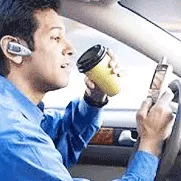April is National Distracted Driving Awareness Month, a time during which government agencies and nonprofit groups raise awareness about the dangers of distracted driving. According to Distraction.gov, did you know that:
- In 2014, more than 3,100 people were killed and more than 100,000 were injured in crashes involving a distracted driver.
- Texting or reading a text for 5 seconds while driving 55 miles per hour is like driving the length of a football field blindfolded.
- Since 2010, at any given moment during daylight hours, an average of 660,000 drivers across America are texting while driving or using an electronic device while attempting to drive.
Distracted driving significantly increases the chances that a driver will cause a motor vehicle crash. When such a crash occurs, the distracted driver may be held responsible for the injuries he or she causes to others if the injured parties are able to prove that the distracted driver is the one who is at fault for causing the crash. Aside from texting while driving, other common types of distracted driving include:
- Talking on the phone while driving (whether using a hands-free or handheld device)
- Attempting to dial a number (again, regardless of whether the driver is using a hands-free or handheld device)
- Adjusting the radio in the car
- Attempting to calm a fussy child in the car
- Paying attention to a pet that is in the car
- Looking at scenery or advertisements while driving
- Observing the antics of a passenger while the car is in motion (this is why it is usually not a good idea for new teenage drivers to drive or ride with their friends)
- Daydreaming or “getting lost in one’s thoughts”
Distracted Driving: It’s Not Just Texting
When individuals think of “distracted driving,” an image of a driver speedily typing a text message on his or her phone while quickly looking out the windshield every few seconds may come to mind. Although texting while driving is one of the most common types of distracted driving, it is by no means the only type. Distracted driving can occur any time a driver diverts his or her focus and attention away from driving. Distracted driving even occurs when a driver claims he or she is dividing his or her attention between driving and some other task.
What Is Cognitive Distraction?
Cognitive distraction refers to something that distracts the thoughts and attention (rather than the sight) of the driver. This causes the driver to lose awareness about where he or she is and what he or she is doing. In other words, he or she is no longer concentrating on the act of driving. A driver who daydreams or “gets lost” in a song is cognitively distracted, as is a driver who is worried and anxious about an upcoming meeting. Even if the driver’s eyes are fixed straight ahead, a cognitively distracted driver can fail to see obstacles and hazards and may not react in time to avoid colliding with other cars.
Is Distracted Driving Considered Negligent?
Distracted driving is an example of careless or negligent behavior because an objective and reasonably careful driver in North Carolina would not text and drive or drive while distracted. Drivers who are negligent and whose negligence causes an injury in an accident may be held liable.
In order to prove a driver should be held liable for injuries, the injured person would have to show that the allegedly negligent driver did, in fact, engage in careless behavior and that this careless behavior caused the injuries. A distracted driver may not be liable for a crash if a judge or jury determines that the injured driver was also negligent and careless and contributed to the crash.
It’s the Law: No Texting While Driving
It is illegal for all drivers in the state of North Carolina to text while driving. In addition, there is a ban that prevents novice drivers (those drivers younger than 18) and bus drivers from using any cell phone device while driving regardless of whether the device is handheld or hands-free. Other drivers are able to use a cellphone to make a call while driving (again, though, all drivers of all ages and occupations are banned from sending or reading text messages while driving). Violations are considered Class 2 misdemeanors under the applicable statute and are punishable by a fine of not less than $100. More serious or repeat violations may result in the imposition of a term of confinement in the local jail. For more information about North Carolina laws, visit our legal resources page.
Take the Pledge for the “It Can Wait” Campaign
AT&T’s “It Can Wait” campaign is designed to raise awareness about the dangers of distracted driving by providing resources to individuals and businesses free of charge. These resources include stories about people and families who have been affected by distracted drivers and ways that individuals can become involved in advocating for stricter distracted driving laws in their communities and states. Visitors can also take a “pledge” that they will not text while driving or drive while distracted. So far, according to the site, more than 7 million people have taken the pledge to not drive while distracted by a text message.
Contact a Distracted Driving Attorney Today
If you or a loved one has been involved in a texting accident or suspect that another distracted driver is to blame for causing the crash, contact the experienced and helpful distracted driving attorneys at Teddy, Meekins & Talbert, P.L.L.C. Our lawyers have helped numerous clients throughout North Carolina, including in the cities of Shelby, Lincolnton, Gastonia, and Rutherfordton, and the counties of Cleveland, Gaston, Lincoln, and Rutherford. Do not delay: You only have a limited amount of time following a distracted driving crash within which to file your claim for compensation. Contact our office today by phone or by using our online form to discuss your case with us.
A lifelong resident of Shelby, North Carolina, David Teddy was raised with a strong desire to help the people of the community he grew up in. It was this desire to help others along with his appreciation of the art of debate that first spurred his drive to practice law.



